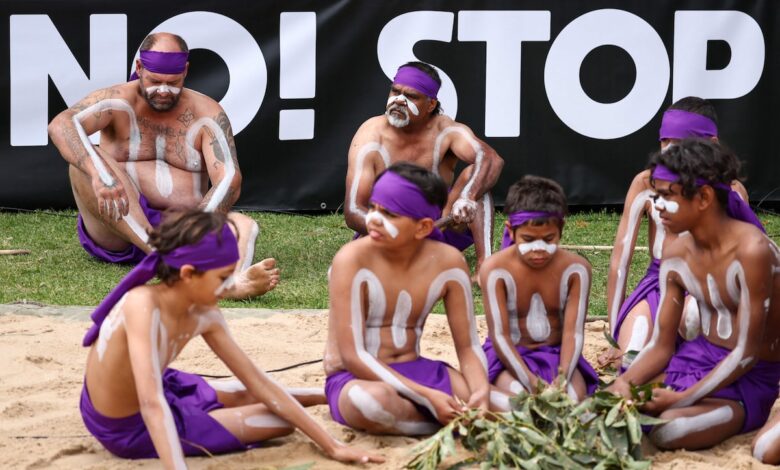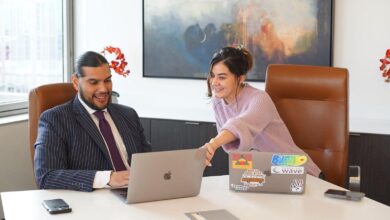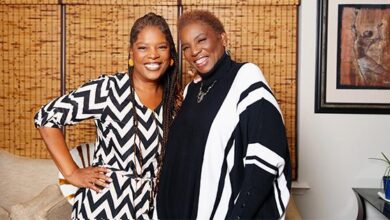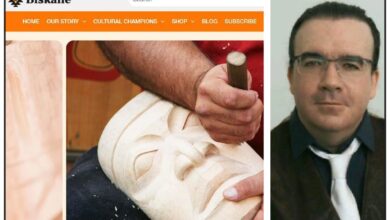As Yes side struggles ahead of Australian referendum, Indigenous people hear harsher words than No


Australian Prime Minister Anthony Albanese sits with Indigenous leaders on Oct. 10 at Uluru Kata Tjuta National Park, the site where, eight years earlier, advocates released the ‘Uluru Statement from the Heart’ printed in front of them. That statement called for a new Indigenous elected body in Parliament.AFP via Getty Images
Addressing supporters after his Labor Party won last year’s election, incoming Australian Prime Minister Anthony Albanese acknowledged the traditional owners of the land on which he stood, and promised his government would “embrace the Uluru Statement from the Heart.”
That document, drawn up in 2017 by a convention of First Nations people from across Australia, called for an Indigenous Voice to Parliament, a constitutionally protected federal body that would advise lawmakers on matters affecting Aboriginal and Torres Strait Islander people, who make up about 3.2 per cent of the population. The Voice, it was felt, would be a step toward recognizing Indigenous sovereignty and undoing historical wrongs on a continent once declared “terra nullius,” or belonging to nobody, by British colonizers.
Around the time Mr. Albanese made his speech, polling showed strong support for The Voice, giving any referendum a good chance of clearing the “double majority” bar required for constitutional change in Australia: winning more than half of votes nationally and in at least four of the country’s six states.
By August however, when the Prime Minister officially announced Oct. 14 as voting day, support had fallen through the floor. Today it sits around 40 per cent, and The Voice seems headed for defeat, after a bruising, ugly campaign that has unearthed a level of racism against Indigenous people many hoped the country had moved beyond. “There have been times in this debate when I’m not sure if it’s 2023 or 1963,” said Ian Hamm, a Melbourne-based Yorta Yorta activist. “It’s really exposed something quite unsettling.”
13YARN, a crisis support line for First Nations people, said the number of callers reporting instances of abuse, racism and trauma had increased 108 per cent compared with last year, with a major spike in calls overall as more Indigenous people turn to the service for support.
Kishaya Delaney, a Wiradjuri lawyer and Vote Yes campaigner based in Sydney, said Australia often had a “bit of a blind spot when it comes to the real problem with racism we have, and this has shone a light on that.” Ms. Delaney, who has run workshops in New South Wales about The Voice, said while most people want to get more information, disinformation and prejudice were a major issue and can twist the debate.
“There is really extreme racism on one end, but there’s also a lot of people whose understanding of Aboriginal communities and Aboriginal people is tinged by racial stereotypes, whether they’re aware of that or not,” she added.

Indigenous performers attend a No campaign event in Sydney.DAVID GRAY/AFP via Getty Images
Prominent members of the “No” campaign have reacted with outrage to accusations of bigotry, but they have also leaned on the issue of race to whip up opposition. Speaking in parliament in May, opposition Liberal Leader Peter Dutton accused Mr. Albanese of seeking to “re-racialise our nation” and “permanently divide us by race.”
“Changing our constitution to enshrine a Voice will take our country backwards, not forwards,” he added. “It will have an Orwellian effect where all Australians are equal, but some Australians are more equal than others.”
There has long been bipartisan support for recognizing Indigenous sovereignty, and the first steps toward enacting some of the Uluru Statement were taken by the previous Liberal-National coalition government. But Mr. Dutton has thrown his weight behind Vote No as a way to weaken Mr. Albanese, angering even some members of his party: shadow indigenous affairs minister Julian Leeser resigned in protest in April.
On a September evening, boys play as people watch the sunset in Alice Springs, where just over a quarter of the population is Indigenous. Unlike their counterparts in Canada or New Zealand, Australia’s first peoples have no treaties with settlers, hence no constitutional protection for treaty rights.Jaimi Joy/Reuters
:format(jpeg)/cloudfront-us-east-1.images.arcpublishing.com/tgam/PBETRNRXJ5BVJKPZ3HATIR4KKA.JPG)
Jaimi Joy/Reuters
:format(jpeg)/cloudfront-us-east-1.images.arcpublishing.com/tgam/SEDXU36Q3VAYPOM77N5TOZ5J4Q.JPG)
Jaimi Joy/Reuters
:format(jpeg)/cloudfront-us-east-1.images.arcpublishing.com/tgam/UJMLPDFLF5GM3DJRQC5VTHK7G4.JPG)
Jaimi Joy/Reuters
:format(jpeg)/cloudfront-us-east-1.images.arcpublishing.com/tgam/KESPBJDNZNHGHJVSSPG3TEOOQ4.JPG)
Jaimi Joy/Reuters
The referendum has also been seized upon as an issue by conspiracy groups who first emerged to protest COVID-19 lockdowns and vaccines. At Vote No marches last month, signs referencing supposed pedophile rings, the dangers of 5G technology and the U.S. conspiracy cult QAnon could be seen, along with those of neo-Nazi groups, one of which unfurled a large banner reading “Voice = Anti White.”
In an analysis of around 250,000 tweets between March and May, Timothy Graham, a researcher at the Queensland University of Technology, said “politicians and media outlets” had played a “pivotal role” in shaping the discourse around The Voice, which he characterized as plagued by ”misinformation and conspiracy theories stemming from Vote No campaigners.”
The Australian Associated Press’s FactCheck team has also found substantial amounts of disinformation, much of it coming from opponents of The Voice, who have falsely claimed it would be able to veto legislation, affect land rights or create additional Indigenous lawmakers. Racist memes depicting Aboriginal people as alcoholics, dependent on welfare or violent have also spread widely.

Placards at a Sydney rally oppose not just The Voice but other conservative bêtes noires such as the ’15-minute city,’ central banks and COVID-19 policies.DAVID GRAY/AFP via Getty Images
Not all opponents of The Voice are motivated by racism. Some complain the proposal is poorly thought out and lacking in detail, making voting for it a potentially risky gamble with constitutional consequences. Meanwhile some Indigenous opponents of the proposal regard it as a lacklustre measure that would do little to reverse decades of marginalization. Analysts said the “No” camp had an easier time convincing people, as they just had to create a small amount of doubt, rather than persuade voters to support a constitutional change they may not understand.
Indigenous Australians have a life expectancy on average 10 years shorter than the rest of the population, and face far higher rates of incarceration, suicide and child mortality. Since 2009, the Australian government has released annual “Closing the Gap” reports, but little progress has been made, with some metrics even going backwards.
“The progressive No argument is right in a lot of ways, we do deserve better, this is a very modest reform,” said Ms. Delaney. But she added that without The Voice, it was “pretty much impossible” to imagine Australia granting First Nations people treaty rights in the near future, as some on the left hope for.
As the debate has become uglier and The Voice appears headed for defeat, some Indigenous opponents have switched sides. Meriki Onus, a leader of the Warriors of the Aboriginal Resistance who had argued for “Treaty Before Voice,” said this month she would vote Yes, as a victory for the No campaign “is a worse option.”
Ms. Onus had argued non-Indigenous people should not be debating and voting on matters which affect First Nations people, something which has been difficult for many Indigenous Australians. Mr. Hamm, the Melbourne campaigner, was born just before a 1967 referendum on whether to include First Nations Australians in official population counts.
“For the second time in my life, my value and worth as a human being is being judged by my fellow Australians,” he said. “That debate was ‘do we belong in this country,’ this is about whether we should be able to speak.” It appeared, he added, that many of his countrymen “will tell me that I have to be silent, that I can’t have a say in decisions that affect me.”
Mr. Hamm said the referendum had exposed the gulf between Indigenous and non-Indigenous Australians, comparing the situation to a vote in 2017 on same-sex marriage, which passed with strong support. “People knew gay people, they had family members or friends who are gay,” he said. “Not many people know Aboriginal people in this country.”
One positive that may come out of the debate is that non-Indigenous Australians have been forced to reckon with what First Nations people have always known about their country, said Ms. Delaney. “The optimist in me says that there are millions of Australians who have had a fire lit inside them,” she added. “I’ve had people ask me ‘win or lose, how do we carry this on.’ ”
But the damage done to Indigenous Australians, and to the wider sovereignty cause, by defeat on Oct. 14 could be too great for such silver linings to be much solace. No one interviewed for this story expected lawmakers to legislate on an issue voters had rejected, and a No victory could hang over not only Labor but also the Liberal-National Coalition, which may struggle to win back the centrist votes it lost in the last election after staking out such a hard-right position in this debate.
Australia’s national and Aboriginal flags fly side by side in Canberra, the Australian capital, where legislators must decide their next steps depending how the referendum goes.AAP Image/Lukas Coch via REUTERS
Some have compared the referendum to Australia’s “Brexit moment,” and while Britain’s decision to leave the European Union had far wider consequences politically and economically, rejecting The Voice could damage Canberra’s standing in the world, said Ryan Neelam, director of the Public Opinion and Foreign Policy Program at the Lowy Institute.
“Whatever nuance there may be in the reasons for people to vote No, that will be lost in the headlines seen and heard overseas, where people will see only that Australia turned down an opportunity to listen to its First Peoples,” he said. “That will be hard for Australia’s government and diplomats to explain.”
While Mr. Neelam, a former diplomat himself, was careful not to overestimate the damage a No vote might do to Australia’s bilateral relations, he said it will nevertheless harm Canberra’s ability to lobby at international forums on certain topics. “When we seek to advance the cause of human rights or speak on Indigenous issues, it’s going to be harder to do so with credibility, when there is such a gaping hole back home.”
With a report from Evan Annett.
Shades of Charlottetown in Australia’s choice on the Voice
Like Australians today, Canadians in the 1990s got to vote on a constitutional plan that, among other things, would have given Indigenous people a dedicated space in Parliament. What happened? The Globe explains how history and treaty rights unfolded differently

:format(jpeg)/cloudfront-us-east-1.images.arcpublishing.com/tgam/2PRUZ5TOPVAYDJ7RBG6RW2QEFQ.JPG)



